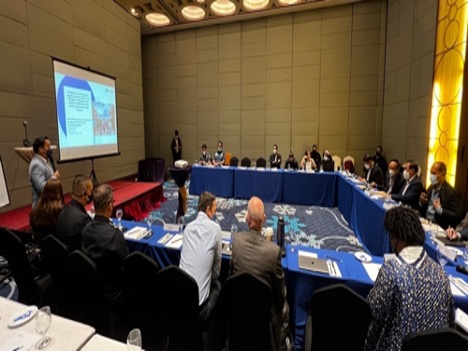BY LEANDER C. DOMINGO
MANILA (August 15)—Through the Defense Threat Reduction Agency (DTRA) Cooperative Threat Reduction (CTR) Program, the United States government has expressed support to the Philippines in addressing biological and chemical security threats.
In a series of meeting with the Philippine government from July 27 to August 2, the US government discussed current and future biological threat reduction and chemical security capacity-building initiatives in the Philippines.

Representatives from the DTRA met officials of the Department of Health, the Department of Agriculture, the Department of Science and Technology, and the Department of Interior and Local Government.
According to the US Embassy in the Philippines, the meeting was for an exchange on a five-year biological threat reduction and chemical security capacity-building program, the development of a sub-national level laboratory network, and potential future training opportunities on chemical security and bio-risk management.
The embassy noted that over the next five years, the CTR Program will support activities to enhance interagency systems, communication, and other capabilities to prepare the Philippines to prevent, detect, track, report, respond to, and secure biothreat agents and chemicals of security concern.
DTRA CTR Program Manager Michelle Nalabandian said they are proud to be a partner in the multi-year effort to jointly address biological and chemical security threats.
“We value our longstanding partnership with interagency partners in the Philippines and look forward to continuing to work together on threat reduction efforts,” Nalabandian said.
Officer-in-Charge Dr. Reildrin Morales of the Bureau of Animal Industry stressed the importance of upgrading the capacity of the Philippines’ veterinary services.
“[The CTR Program] will enhance the BAI-Animal Disease Diagnosis and Reference Laboratory to prevent and control the entry and spread of transboundary animal diseases that may pose a threat to the country’s agriculture economy,” Morales said.
A US government program, the CTR Biological Threat Reduction Program (BTRP) has been a partner of the Philippine government since 2016. It concluded a five-year project to renovate seven Regional Animal Disease Diagnostic Laboratories spread throughout the Philippines in 2021.
The embassy said these facilities have increased the Philippines’ capacity to detect and diagnose endemic and emerging diseases in the country and have been critical in the local response to African Swine Fever, Avian Influenza, and Covid-19.
Another US program, DTRA’s Chemical Security and Elimination (CSE) Program is also working with the Philippine government to build a national training center and create a chemical security curriculum in the country.
The embassy noted that since 2018, the CSE Program has engaged with the Philippine government and the Chemical, Biological, Radioactive, and Nuclear Response National Team on strategic trade management, chemical transportation security, and the development of a national list of chemicals of security concern.
DTRA enables the US Department of Defense, the US government, and international partners to counter and deter weapons of mass destruction and emerging threats, the embassy added.
